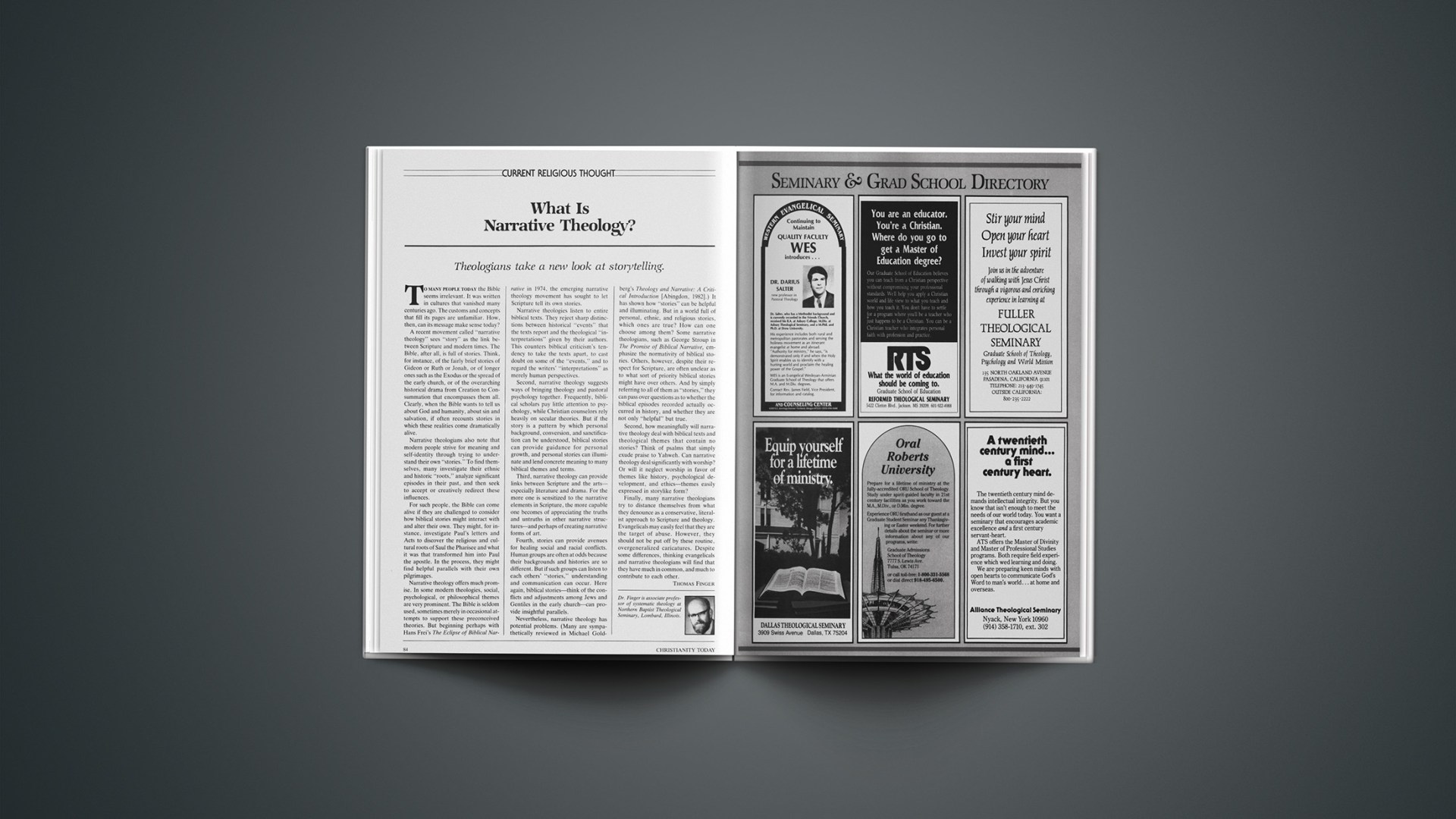Theologians take a new look at storytelling.
To many people today the Bible seems irrelevant. It was written in cultures that vanished many centuries ago. The customs and concepts that fill its pages are unfamiliar. How, then, can its message make sense today?
A recent movement called “narrative theology” sees “story” as the link between Scripture and modern times. The Bible, after all, is full of stories. Think, for instance, of the fairly brief stories of Gideon or Ruth or Jonah, or of longer ones such as the Exodus or the spread of the early church, or of the overarching historical drama from Creation to Consummation that encompasses them all. Clearly, when the Bible wants to tell us about God and humanity, about sin and salvation, if often recounts stories in which these realities come dramatically alive.
Narrative theologians also note that modern people strive for meaning and self-identity through trying to understand their own “stories.” To find themselves, many investigate their ethnic and historic “roots,” analyze significant episodes in their past, and then seek to accept or creatively redirect these influences.
For such people, the Bible can come alive if they are challenged to consider how biblical stories might interact with and alter their own. They might, for instance, investigate Paul’s letters and Acts to discover the religious and cultural roots of Saul the Pharisee and what it was that transformed him into Paul the apostle. In the process, they might find helpful parallels with their own pilgrimages.
Narrative theology offers much promise. In some modern theologies, social, psychological, or philosophical themes are very prominent. The Bible is seldom used, sometimes merely in occasional attempts to support these preconceived theories. But beginning perhaps with Hans Frei’s The Eclipse of Biblical Narrative in 1974, the emerging narrative theology movement has sought to let Scripture tell its own stories.
Narrative theologies listen to entire biblical texts. They reject sharp distinctions between historical “events” that the texts report and the theological “interpretations” given by their authors. This counters biblical criticism’s tendency to take the texts apart, to cast doubt on some of the “events,” and to regard the writers’ “interpretations” as merely human perspectives.
Second, narrative theology suggests ways of bringing theology and pastoral psychology together. Frequently, biblical scholars pay little attention to psychology, while Christian counselors rely heavily on secular theories. But if the story is a pattern by which personal background, conversion, and sanctification can be understood, biblical stories can provide guidance for personal growth, and personal stories can illuminate and lend concrete meaning to many biblical themes and terms.
Third, narrative theology can provide links between Scripture and the arts—especially literature and drama. For the more one is sensitized to the narrative elements in Scripture, the more capable one becomes of appreciating the truths and untruths in other narrative structures—and perhaps of creating narrative forms of art.
Fourth, stories can provide avenues for healing social and racial conflicts. Human groups are often at odds because their backgrounds and histories are so different. But if such groups can listen to each others’ “stories,” understanding and communication can occur. Here again, biblical stories—think of the conflicts and adjustments among Jews and Gentiles in the early church—can provide insightful parallels.
Nevertheless, narrative theology has potential problems. (Many are sympathetically reviewed in Michael Goldberg’s Theology and Narrative: A Critical Introduction [Abingdon, 1982].) It has shown how “stories” can be helpful and illuminating. But in a world full of personal, ethnic, and religious stories, which ones are true? How can one choose among them? Some narrative theologians, such as George Stroup in The Promise of Biblical Narrative, emphasize the normativity of biblical stories. Others, however, despite their respect for Scripture, are often unclear as to what sort of priority biblical stories might have over others. And by simply referring to all of them as “stories,” they can pass over questions as to whether the biblical episodes recorded actually occurred in history, and whether they are not only “helpful” but true.
Second, how meaningfully will narrative theology deal with biblical texts and theological themes that contain no stories? Think of psalms that simply exude praise to Yahweh. Can narrative theology deal significantly with worship? Or will it neglect worship in favor of themes like history, psychological development, and ethics—themes easily expressed in storylike form?
Finally, many narrative theologians try to distance themselves from what they denounce as a conservative, literalist approach to Scripture and theology. Evangelicals may easily feel that they are the target of abuse. However, they should not be put off by these routine, overgeneralized caricatures. Despite some differences, thinking evangelicals and narrative theologians will find that they have much in common, and much to contribute to each other.
THOMAS FINGER1Dr. Finger is associate professor of systematic theology at Northern Baptist Theological Seminary, Lombard, Illinois.










